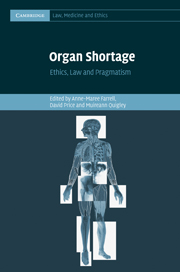Book contents
- Frontmatter
- Contents
- List of figures
- List of tables
- Contributors
- Acknowledgements
- List of abbreviations
- Table of cases
- Table of legislation
- Part I Setting the scene
- Part II Current issues affecting organ shortage
- Part III Strategies for addressing organ shortage
- 6 Incentivising organ donation
- 7 Making the margins mainstream: strategies to maximise the donor pool
- 8 The allocation of organs: the need for fairness and transparency
- 9 Ante-mortem issues affecting deceased donation: an ethico-legal perspective
- Part IV Comparative perspectives
- Part V Current reform and future challenges
- Bibliography
- Index
7 - Making the margins mainstream: strategies to maximise the donor pool
from Part III - Strategies for addressing organ shortage
Published online by Cambridge University Press: 29 March 2011
- Frontmatter
- Contents
- List of figures
- List of tables
- Contributors
- Acknowledgements
- List of abbreviations
- Table of cases
- Table of legislation
- Part I Setting the scene
- Part II Current issues affecting organ shortage
- Part III Strategies for addressing organ shortage
- 6 Incentivising organ donation
- 7 Making the margins mainstream: strategies to maximise the donor pool
- 8 The allocation of organs: the need for fairness and transparency
- 9 Ante-mortem issues affecting deceased donation: an ethico-legal perspective
- Part IV Comparative perspectives
- Part V Current reform and future challenges
- Bibliography
- Index
Summary
In 1955, Hume and colleagues published a report of the first blood group incompatible renal transplant. The recipient had early rejection on day seven. In the fifty years since, experimental immunobiology has been able to explain why: naturally occurring antibodies (part of the body's natural defence against infection) attack and damage the transplanted graft. Recently, techniques have become available to remove these, and other, circulating antibodies. These techniques, along with the development of newer and more powerful immunosuppression (anti-rejection) treatment regimes, have made organ transplants that were previously thought to be impossible, because of the presence of a prohibitive incompatible circulating antibody, a reality.
Of course, if the supply of compatible organs available for clinical transplantation was surplus to demand, it might never have been necessary for science to understand and explain how best to overcome these immunological barriers. Likewise, it would have been difficult for clinicians to justify performing experimental transplants on people when less problematic treatment (transplant) solutions were available to them. However, demand for organs has long outstripped supply and the number of individuals in need of a transplant is on the rise. So, in the knowledge that transplantation is the optimal treatment for almost all those in need of an organ, identifying and developing ways in which organs can be made available for transplantation has become a major priority. Antibody incompatible transplantation is just one example.
Organ shortage makes it likely that it will not always be possible to find an ‘ideal’ donor.
- Type
- Chapter
- Information
- Organ ShortageEthics, Law and Pragmatism, pp. 104 - 121Publisher: Cambridge University PressPrint publication year: 2011



